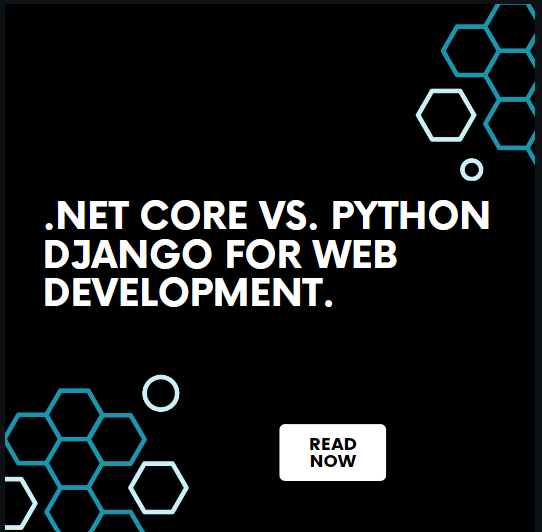Introduction
In the ever-evolving landscape of web development, choosing the right framework is paramount to the success of your project. Two prominent contenders in this arena are .NET Core and Python Django. Both have garnered a strong following, each with its own set of strengths and features. In this article, we will delve into the nuances of both frameworks, shedding light on their key attributes to help you make an informed decision for your next project.
.NET Core: Powering Robust .NET Development Services
.NET Core, the brainchild of Microsoft, has emerged as a versatile and open-source framework that facilitates cross-platform development. Known for its high-performance capabilities, .NET Core is the backbone of many enterprise-level applications and has thriving community support. It offers a wide array of libraries and tools that expedite the development process.
Key Advantages of .NET Core:
- Cross-Platform Compatibility: .NET Core allows developers to build applications that run seamlessly on Windows, Linux, and macOS, ensuring maximum reach for your project.
- Performance Excellence: Thanks to its just-in-time compilation, .NET Core boasts impressive speed and performance, making it an excellent choice for high-demand applications.
- Rich Ecosystem: The extensive collection of libraries, known as NuGet packages, provides pre-built modules that simplify development, saving time and effort.
- Enterprise-Ready: .NET Core is well-suited for large-scale applications, offering robust support for complex business logic and scalability.
- Security-Focused: With features like data protection APIs and Identity Core, .NET Core ensures that security remains a top priority.
Python Django: Rapid Development with Elegance
Python Django, a high-level web framework, emphasizes rapid development and pragmatic design. It follows the “batteries included” philosophy, meaning it provides a comprehensive set of features out of the box, reducing the need for third-party integrations. Django is renowned for its simplicity, making it an excellent choice for startups and smaller teams.
Key Advantages of Python Django:
- Rapid Development: Django’s “Don’t Repeat Yourself” (DRY) principle and built-in admin interface accelerate the development process, allowing for swift project deployment.
- Batteries Included: Django comes with a plethora of built-in modules for common functionalities like authentication, admin panels, and databases, reducing the need for additional configurations.
- ORM and Migrations: Django’s Object-Relational Mapping (ORM) simplifies database interactions, allowing developers to work with models and queries in a Pythonic way. Migrations make database schema updates painless.
- Scalability: While it may not match the sheer scalability of .NET Core, Django remains a solid choice for a wide range of applications, particularly those with medium to high traffic.
- Community and Documentation: Django has a vibrant community and extensive documentation, ensuring that developers can find solutions and best practices with ease.
Making a choice: Which Framework to Use?
Ultimately, the decision between .NET Core and Python Django depends on the specific requirements of your project.
Choose .NET Core for:
- Enterprise-level applications with a focus on performance and scalability.
- Projects that require seamless integration with other Microsoft technologies.
- Teams already proficient in C# or F#.
Choose Python Django for:
- Rapid prototyping and development of content-driven applications.
- Projects with a preference for simplicity and clean, readable code.
- Startups and small to medium-sized projects with limited resources.
Conclusion
In the dynamic world of web development, the choice between .NET Core and Python Django is a pivotal decision that can significantly impact your project’s success. .NET Core stands strong with its robust performance and extensive library support, making it an ideal choice for enterprise-level applications. On the other hand, Python Django offers rapid development and simplicity, making it an excellent fit for startups and smaller teams. Assess your project’s specific requirements, weigh the advantages of each framework, and make an informed decision that aligns with your development goals. Happy coding!

